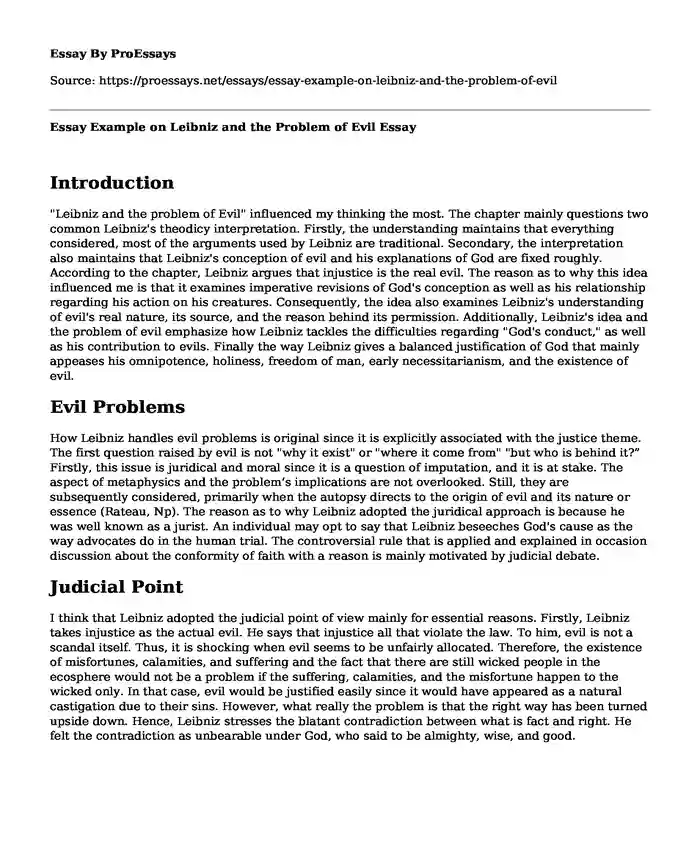Introduction
"Leibniz and the problem of Evil" influenced my thinking the most. The chapter mainly questions two common Leibniz's theodicy interpretation. Firstly, the understanding maintains that everything considered, most of the arguments used by Leibniz are traditional. Secondary, the interpretation also maintains that Leibniz's conception of evil and his explanations of God are fixed roughly. According to the chapter, Leibniz argues that injustice is the real evil. The reason as to why this idea influenced me is that it examines imperative revisions of God's conception as well as his relationship regarding his action on his creatures. Consequently, the idea also examines Leibniz's understanding of evil's real nature, its source, and the reason behind its permission. Additionally, Leibniz's idea and the problem of evil emphasize how Leibniz tackles the difficulties regarding "God's conduct," as well as his contribution to evils. Finally the way Leibniz gives a balanced justification of God that mainly appeases his omnipotence, holiness, freedom of man, early necessitarianism, and the existence of evil.
Evil Problems
How Leibniz handles evil problems is original since it is explicitly associated with the justice theme. The first question raised by evil is not "why it exist" or "where it come from" "but who is behind it?” Firstly, this issue is juridical and moral since it is a question of imputation, and it is at stake. The aspect of metaphysics and the problem’s implications are not overlooked. Still, they are subsequently considered, primarily when the autopsy directs to the origin of evil and its nature or essence (Rateau, Np). The reason as to why Leibniz adopted the juridical approach is because he was well known as a jurist. An individual may opt to say that Leibniz beseeches God's cause as the way advocates do in the human trial. The controversial rule that is applied and explained in occasion discussion about the conformity of faith with a reason is mainly motivated by judicial debate.
Judicial Point
I think that Leibniz adopted the judicial point of view mainly for essential reasons. Firstly, Leibniz takes injustice as the actual evil. He says that injustice all that violate the law. To him, evil is not a scandal itself. Thus, it is shocking when evil seems to be unfairly allocated. Therefore, the existence of misfortunes, calamities, and suffering and the fact that there are still wicked people in the ecosphere would not be a problem if the suffering, calamities, and the misfortune happen to the wicked only. In that case, evil would be justified easily since it would have appeared as a natural castigation due to their sins. However, what really the problem is that the right way has been turned upside down. Hence, Leibniz stresses the blatant contradiction between what is fact and right. He felt the contradiction as unbearable under God, who said to be almighty, wise, and good.
Conclusion
In a nutshell, the connection between justice and evil elaborate on why Leibniz decided to inscribe a theodicy. Hence, considering the tenure in which the evil problem is formulated, the answer can only be given to the "doctrine of divine justice." The doctrine aims to prose the innocence and holiness of God and make known the rules of his deed against his creatures (Irwin 164). Therefore, God is the primary source of perfection, reality and being. Evil, on the other side, cannot be termed as the positive antagonistic force; however, it entails reluctance and privation. The connatural limitations thus make failure possible, but it neither necessitate man to commit any sin. In making it actual, then liberty should be required. Man is therefore accountable for his sin, and it's up to him to accept the gift of God or resist them.
Works Cited
Irwin, Kristen. "Leibniz on the Problem of Evil, by P. Rateau." The Leibniz Review 29 (2019): 161-165.
Rateau, Paul. Leibniz on the Problem of Evil. Oxford University Press, USA, 2019.
Cite this page
Essay Example on Leibniz and the Problem of Evil. (2024, Jan 01). Retrieved from https://proessays.net/essays/essay-example-on-leibniz-and-the-problem-of-evil
If you are the original author of this essay and no longer wish to have it published on the ProEssays website, please click below to request its removal:
- Essay Sample on Why People Pursue Meaning Instead of Happiness in Life
- TED Talk on Stress by Kelly McGonigal - Essay Sample
- Paper Example on My Nature Escapades: Exploring Waterfalls for Stress Relief
- Essay Example on Anxiety Diagnosis: Features & History to Elicit
- Essay Example on Aging Out: The Process of Leaving Foster Care
- Essay Example on the Changing Landscape of Love: From Sacred Institution to Modern Society
- Free Essay on Online Dating and Traditional Dating







